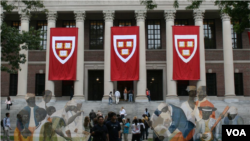Harvard joins Georgetown University in addressing their ties to slavery.
Scholars presented their research on slavery tied to universities across the United States at aconference held at the Radcliffe Institute for Advanced Study at Harvard earlier in March.
"Harvard was directly complicit in slavery from the college's earliest days in the 17th century until the system of bondage ended in Massachusetts in 1783," said Harvard President Drew Faust at the conference.
Harvard made its first public acknowledgement of their ties to slavery at the conference.
Harvard has taken their connections to slavery more seriously in recent years. It created a website named HarvardandSlavery that shares their investigations with the public. Harvard has also added an exhibition, "Bound by History: Harvard, Slavery, and Archives," to present the university's research.
The "new show is just the beginning of an ongoing effort to explore the difficult dimensions of Harvard’s past," according to exhibit organizers.
"There are so many iconic buildings and important spaces on campus, most of which have connections to the stories we are trying to tell here,” said archivist Ross Mulcare.
Some locations on Harvard's campus with ties to slavery are the Greenleaf Home, the Wadsworth House, and the Dana-Palmer House.
The university is hoping to add another exhibition based on research by Harvard faculty and others who continue to focus on how slavery is connected to Harvard, as explained university archivist Megan Sniffin-Marinoff.
Harvard's President, Drew Gilpin Faust, is a historian of the American South and the Civil War. Her passions have led her to pursue increased research in Harvard's ties to slavery, as Harvard was the first university in Colonial America.
Four Harvard undergraduate students looked into Harvard's past with slavery in 2007. A decade later, Faust and Congressman John Lewis presented a plaque in honor of slaves who worked and lived at the Wadsworth House in the 1700s.
Other universities addressing the issue are Yale (Connecticut), Rutgers (New Jersey), University of Maryland, University of North Carolina-Chapel Hill, Vanderbilt (Tennessee), Brown (Rhode Island), Winthop (South Carolina), Clemson (South Carolina), University of Alabama, and University of Mississippi.
What do you think about Harvard's slavery acknowledgement? Please leave a comment here, and visit us on Facebook, Twitter, Instagram and LinkedIn, thanks!
Scholars presented their research on slavery tied to universities across the United States at aconference held at the Radcliffe Institute for Advanced Study at Harvard earlier in March.
"Harvard was directly complicit in slavery from the college's earliest days in the 17th century until the system of bondage ended in Massachusetts in 1783," said Harvard President Drew Faust at the conference.
Harvard made its first public acknowledgement of their ties to slavery at the conference.
Harvard has taken their connections to slavery more seriously in recent years. It created a website named HarvardandSlavery that shares their investigations with the public. Harvard has also added an exhibition, "Bound by History: Harvard, Slavery, and Archives," to present the university's research.
The "new show is just the beginning of an ongoing effort to explore the difficult dimensions of Harvard’s past," according to exhibit organizers.
"There are so many iconic buildings and important spaces on campus, most of which have connections to the stories we are trying to tell here,” said archivist Ross Mulcare.
Some locations on Harvard's campus with ties to slavery are the Greenleaf Home, the Wadsworth House, and the Dana-Palmer House.
The university is hoping to add another exhibition based on research by Harvard faculty and others who continue to focus on how slavery is connected to Harvard, as explained university archivist Megan Sniffin-Marinoff.
Harvard's President, Drew Gilpin Faust, is a historian of the American South and the Civil War. Her passions have led her to pursue increased research in Harvard's ties to slavery, as Harvard was the first university in Colonial America.
Four Harvard undergraduate students looked into Harvard's past with slavery in 2007. A decade later, Faust and Congressman John Lewis presented a plaque in honor of slaves who worked and lived at the Wadsworth House in the 1700s.
Other universities addressing the issue are Yale (Connecticut), Rutgers (New Jersey), University of Maryland, University of North Carolina-Chapel Hill, Vanderbilt (Tennessee), Brown (Rhode Island), Winthop (South Carolina), Clemson (South Carolina), University of Alabama, and University of Mississippi.
What do you think about Harvard's slavery acknowledgement? Please leave a comment here, and visit us on Facebook, Twitter, Instagram and LinkedIn, thanks!




